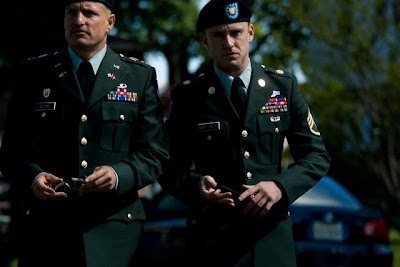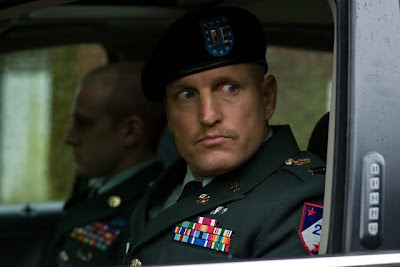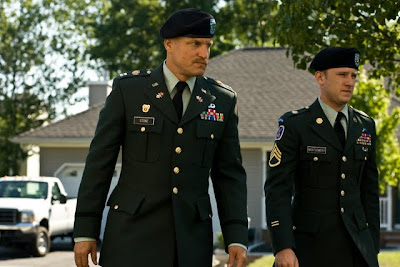When you see them, you know precisely what’s coming. Likewise, when their military issued beeper goes off, they know precisely what’s coming.
Parking their nondescript vehicle far away from the NOK (Next of Kin) and impeccably clad in a non-combat uniform, they walk towards the home of a deceased soldier. Their mission is above all to follow-the-script, avoid musical doorbells in favor of a knock, forgo a standard greeting or introduction, and speak only to the NOK in delivering the news that the soldier in their lives has died somewhere on the other side of the world.
“Killed” and “died," we learn, are the only two words you should ever say since gentler terms like “passing” or “lost” leave room for uncertainty for those in denial. These are just a few of the rules that Captain Tony Stone (Woody Harrelson) shares with Ben Foster’s injured, decorated and returned Iraqi war vet Will Montgomery who has been assigned to the Army’s Casualty Notification team for his three remaining months of military service. Furthermore, Montgomery is additionally warned that hugs are prohibited even if NOKs break down and, similarly that touching is only appropriate in the event of a medical emergency.
Although they are able to share details regarding the incident that have been confirmed, Stone’s recruit is given the strictest warning to memorize their names and always get the facts right since the wrong addresses and soldier information has been given in the past. Advised not to linger but simply return later even if it means walking out on a soldier’s pregnant girlfriend since they weren’t married in time to become his official NOK, Montgomery and Stone’s duty is to get in before the relatives see it on the news and get out especially when confronted by those who react violently. Then they depart with the only reassurance they can share, swiftly telling the NOK, “I’m sorry for your loss” and that the CAO (Casualty Assistance Officer) will be visiting them in four hours to make arrangements.
And even with Captain Tony Stone’s incredibly detailed list guided both by Army procedure and his extensive on-the-job experience, as co-screenwriter Alessandro Camon explains, “It’s never going to be an exact science because the job is to break someone’s heart.” Furthermore, while the amount of rules and military acronyms used add an immediate air of coldness to the team’s “sacred” duty to those outside of the service, it’s evident from the start that the entire system including the “script” the men have to fall back on regardless of what awaits them is what has ensured that Stone’s recovering alcoholic could carry on with his extraordinarily devastating job.
Although alcohol and womanizing are still the two things he relies on—falling off the wagon occasionally and into strangers’ beds repeatedly since he’s unable to sleep after delivering the news—we also realize the morose sense-of-humor and cynical judgments he makes during his missions are part of his ongoing defense mechanism. However, it’s his attitude and the impersonality of the procedure including leaping to assumptions about the lives of those he visits that gets tested when he’s paired up with Foster’s Montgomery.
Based on the two year evolving screenplay he wrote with Alessandro Camon, acclaimed screenwriter Oren Moverman makes his feature filmmaking debut with this quietly powerful near-docudrama. A critical favorite on the film festival circuit, The Messenger not only garnered the support of the military via the Defense Department’s Hollywood liaison office but also ensured authenticity on all levels, using vets as extras who were involved in the film’s twenty-eight day Fort Dix area shoot.
Despite this, I fear that it will be simply too easy for audiences to write off the film as another Iraq movie and the second release in 2009 which is sure to receive Oscar consideration along with Kathryn Bigelow’s Iraq-set, on the battlefield effort The Hurt Locker. However those who seek out The Messenger will be surprised to uncover that it avoids every major war movie cliché and—similar to Hurt Locker—shows us a different aspect of combat than we’ve ever seen before as The Messenger takes place right here at home.
Following his career-making turn in 3:10 to Yuma by managing to steal scenes away from that title’s two marquee stars of Russell Crowe and Christian Bale, which was evident when I screened it in my movie discussion series, Ben Foster returns with another dynamic performance. Introspective, reactive, and—similar to Ryan Golsing’s turn in Half Nelson—as fascinating in his silences as he is with his sparse dialogue, his portrayal of Will, whom he named after an actual soldier he meet at Walter Reed feels heartbreakingly genuine.
While avoiding the label of a message film, the sight of Foster’s injured and emotionally conflicted combat veteran being thrust back into a different aspect of the war as it exists in the United States provides The Messenger with some subtle ironic commentary on just what is happening to our soldiers. Yet by adhering to the authentic military playbook on technique and procedure instead of speech-giving or filling his movie with too many instantly recognizable soldier movie clichés, Moverman’s work becomes far more potent especially when Will Montgomery begins to deviate from Stone’s orders.
After the men are thrown off balance by the controlled reaction of Samantha Morton’s widow Lara who, having been a longtime military wife, actually thanks the men and empathizes with their plight, Montgomery becomes haunted by her bravery in battle. He begins checking up on her, first from afar until he intervenes when he sees her struggle in the mall with gung-ho recruiters. While it’s obvious that there’s a connection between the two that you sense could easily develop into a romance despite the horrific circumstances in which they’d met, fortunately Moverman realizes that to go too far in this direction would be to lose audience respect and authenticity.
Yet, I applauded his courage and the naturalistic style of filmmaking that was particularly evident in a sequence wherein Foster and Morton’s characters actually acknowledge their sexual tension aloud, confront their nerves, fumble, and voice their opinions in the type of footage that would’ve either been left on the cutting room floor of most films or would never have been written in the first place. It’s one of the most exquisite scenes in the film as Morton is given a beautiful speech that finally allows audiences who may have been judging her character beforehand the opportunity to look past the surface and at the same time, watch as Montgomery realizes just how wrong Stone had been in one of own his judgments to gorgeous effect.
Likewise by avoiding the follow-through on an obligatory male bonding fight and refreshingly having enough faith in the intellect of his audience not to have to spell everything out concretely as the slice-of-life in the face-of-death work moves on, Moverman manages to cast quite a haunting spell over viewers. He does so by only touching on issues like the “walking dead” or the effect the war has had in bringing back individuals who’ve shared that they have nothing in common with the person they were before they left as well as the unparalleled loyalty they feel to the overall family of “the Army,” which in some cases has taken precedence over or replaced their own.
Moreover, Moverman’s film is a unique character piece that feels like it has more in common with Tom McCarthy’s The Station Agent than Kathryn Bigelow’s Hurt Locker, which makes The Messenger a wonderful companion film to Locker and also showcases Woody Harrelson, Ben Foster, and Samantha Morton’s best performances in years.
Text ©2009, Film Intuition, LLC; All Rights Reserved. http://www.filmintuition.com
Unauthorized Reproduction or Publication Elsewhere is Strictly Prohibited.























